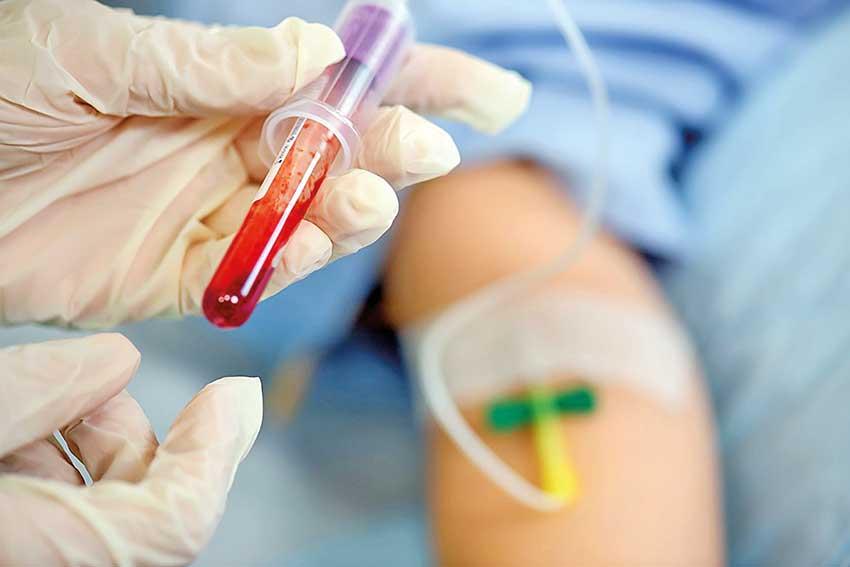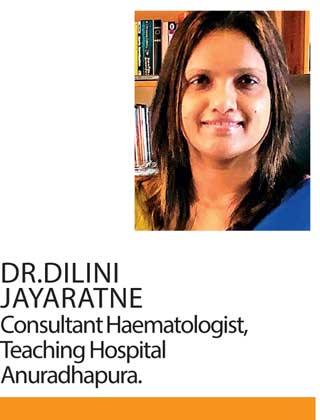Reply To:
Name - Reply Comment

 Hemophilia is an inherited bleeding disorder in which blood does not clot properly. This can lead to spontaneous bleeding and bleeding following injuries or surgery.
Hemophilia is an inherited bleeding disorder in which blood does not clot properly. This can lead to spontaneous bleeding and bleeding following injuries or surgery.
“When we get an external or internal injury it is necessary to arrest excessive bleeding. Here, the process called Hemostasis plays a vital role which is the body’s natural reaction to an injury that stops bleeding and repairs the damage. For Hemostasis to function properly certain factors like platelets and proteins called clotting factors are essential elements,” explained Dr. Dilini Jayaratne, Consultant Haematologist, Teaching Hospital Anuradhapura.
“We all have 13 so called clotting factors in our blood. But people with hemophilia have low level of certain clotting factors. Those who have low factor VIII (8) by birth are called having the disease Haemophilia A or low levels of factor IX (9) by birth are known as Haemophilia B. Both Haemophilia A and Haemophilia B can be mild, moderate, or severe, depending on the amount of clotting factor that is in the blood,” said Dr. Jayaratne.
Etiology, prevalance and risk factors
Haemophilia occurs as result of a genetic mutation which occurs in the X chromosome. (one of sex chromosomes in our cells.) Since it passes through the X chromosome, usually females act as carriers of the disease and males are the ones who get the disease. This means that hemophilia always occurs in boys and is passed from mother to son through one of the mother’s genes. Most women with the defective gene are carriers who have no signs or symptoms of hemophilia.
“Sometimes disease occurs because of a spontaneous genetic mutation without a family history. This means that a person can still get the disease even if none of his or her family members had got haemophilia,” she said.
According to the doctor the estimated frequency of hemophilia is around 1 in 10000 live births, and the number of people worldwide living with the disease is about 400,000.
Signs and symptoms of hemophilia depend on the level of clotting factor present.
In fact, if the clotting-factor level is mildly reduced, bleeding will be noticed only after surgery or trauma. “If the deficiency is severe hemophilia will manifest with spontaneous bleeding without any reason,” explained Dr Jayaratne.
Haemophilia is diagnosed through routine and specialised clotting-based tests under the guidance of a Consultant Haematologist.
“Diagnosis is confirmed by the test called “Factor assay”. With this we can confirm the type and the severity of the disease. If the factor level is less than 1% we call it severe haemophilia and if the level is between 1% -5% it is known as moderate haemophilia and if it is between 5% - 30% the disease is known to be mild in severity. The facility to do factor assay is usually available at the level of teaching hospitals in Sri Lanka. There are 13 such haemophilia centres identified in the government sector hospitals across the country. If anybody is suspected to have haemophilia the patient will need referrals to these haemophilia centres for the confirmation of the diagnosis,” she said.
Treatment
Treatment for Haemophilia is to replace the deficient clotting factor.
2 modalities of treatment available are:
For major bleeding episodes need to replace the deficient clotting factor, give intravenously. For Haemophilia A we give factor viii, for Haemophilia B we give factor ix.
“Ministry of Health usually purchase plasma derived factor viii and ix. We also get recombinant factor products as donations from World Federation of Haemophilia, which has made a huge impact on the patient management,” Dr Jayarathne states.
For minor bleeding
Firm pressure application, ice application, Tranexemic acid
General advice
Newest treatment modalities
Long acting recombinant factor products
Emicizumab – a monoclonal antibody - we started receiving this from 2020 onwards; currently the treatment is given in 3 centers, NHSL, LRH and TH Anuradhapura.
“We have prioritised this treatment to patients with inhibitors and for those who are having high annual bleeding rate. This emicizumab treatment shows very promising results with almost all having zero bleeds.
Gene therapy-Not available in Sri Lanka, under experimental level.